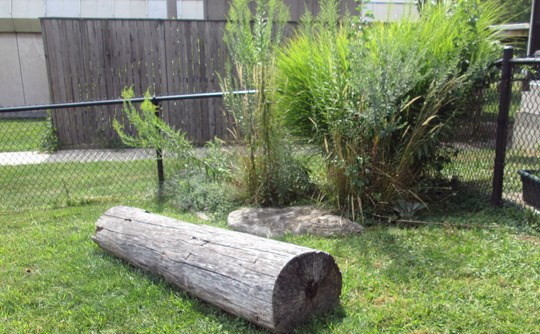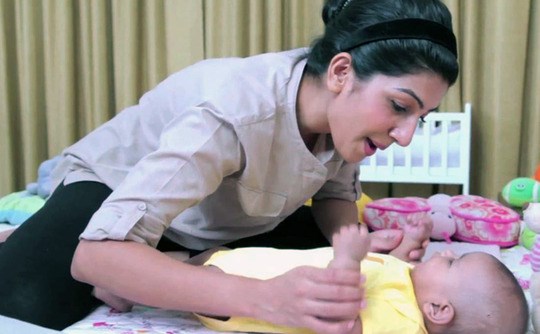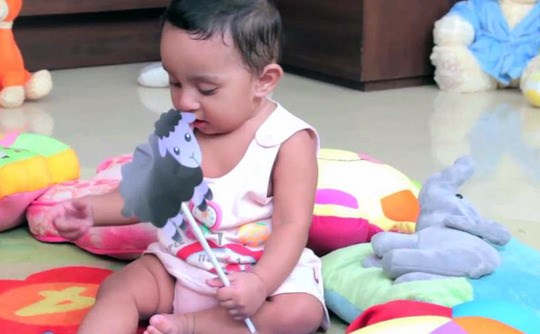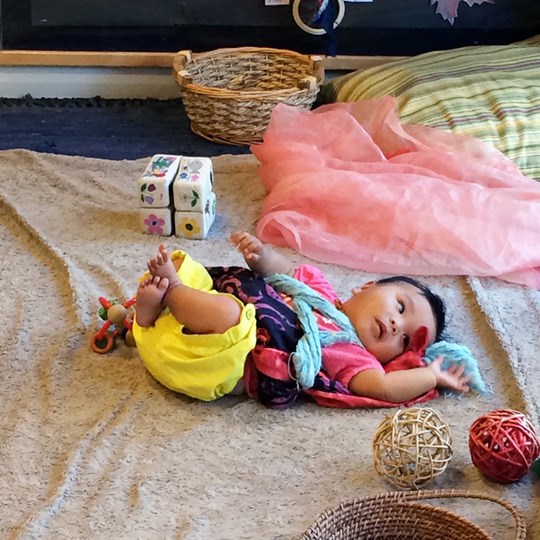Nursery Management: International - Baby rooms of the world
Hannah Crown
Monday, September 21, 2015
Baby rooms in the UK still tend to be the forgotten part of the nursery. What does this provision look like abroad, and can different approaches offer new ideas? Charlotte Goddard investigates.

Many in the sector feel that babies, and those who work with them, can be overlooked when it comes to the development of early years policy. So what inspiration is there to be had from abroad, with its differing cultures, regulations and traditions?
Nurseries in different countries are borrowing from each others' philosophies and research to find the best way forward for the babies in their care - something the UK could also tap into.
The US
Tulsa Educare
A six-month-old baby boy is sitting on the floor with a runny nose. A two-and-a-half-year old girl in the nursery notices the baby's predicament, grabs a tissue, wipes the infant's nose, and walks over to the sink to wash her hands. 'That kind of learning takes place every day,' says Caren Calhoun, executive director at Tulsa Educare, explaining why the organisation's philosophy is to place babies in the same room as toddlers.
Each of Tulsa Educare's classrooms, as they are called, houses up to eight infants and toddlers from the age of six weeks to three years. The babies are cherished by the other children in the group. 'When we get new children in a classroom, it is like they have a new baby in the family,' says Ms Calhoun.
The three nurseries in Tulsa, part of Tulsa Educare's national chain of 21 settings, aim to bridge the achievement gap that exists between at-risk children and their more advantaged peers. While in the UK early years teachers or early years professionals are often placed with the older children, at Tulsa Educare each infant and toddler room employs an honours-degree educated teacher working with a teacher with the equivalent of a foundation degree.
The busiest classrooms also employ a teacher assistant with a Child Development Associate certificate. Children will stay with the same teacher from the moment they join the nursery until they are three years old. They can then transfer to a pre-school room.
Infant and toddler room employees are supervised by a Master Teacher, who also acts as a coach and mentor. Each 'neighbourhood' of four classrooms also has a degree-educated family advocate who works to help parents understand and support their child's development, covering issues such as the benefits of breastfeeding and safety-proofing the home.
Parents are key to Tulsa Educare's work, and the settings have an open door policy. Parents and practitioners can look through two-way mirrors to observe the children without being seen. Teachers and family advocates also visit every infant's home at least twice a year to deepen their understanding of each child's cultural and ethnic heritage, and forge closer bonds with the families.
Looking into Tulsa Educare's classrooms, which are bathed in natural light from low windows, UK practitioners might wonder at the lack of highchairs and bouncy chairs. Restraints are not used unless a child has a special developmental need that requires them. 'Our whole philosophy is to ensure kids can get in and out themselves,' says Ms Calhoun. 'Tables are child sized; we have little chairs, six to eight inches off the ground, and low storage units.'
- www.educareschools.org/locations/tulsa.php
- www.wested.org/service/ the-program-for-infant-toddler-care-trainer-institutes
Indiana University Campus Children's Center
On a sunny day, babies from the age of six weeks to a year can be found being pushed around Indiana University Campus, or crawling or toddling around their play yard.
'We have built natural playgrounds for the infants and toddlers with lots of little hills and valleys for crawling and walking, logs for climbing over, boulders to play "peekaboo", and an embedded slide on a little hill,' says Jasmine Zachariah, co-teacher in the infant/toddler programme. 'We have incorporated fragrances and texture into our playgrounds by planting herbs such as lavender and mint, and succulent plants such as lambs' ears.'
 During a child's first year, the nursery focuses on the development of strong relationships between the caregivers, child and family, believing that when a child trusts their caregiver they are then comfortable exploring the world around them. Ms Zachariah says, 'I firmly believe that attachment is the foundation for all future learning and development, so I focus on each child, spend lots of one-on-one time and shower them with love and caring.'
During a child's first year, the nursery focuses on the development of strong relationships between the caregivers, child and family, believing that when a child trusts their caregiver they are then comfortable exploring the world around them. Ms Zachariah says, 'I firmly believe that attachment is the foundation for all future learning and development, so I focus on each child, spend lots of one-on-one time and shower them with love and caring.'
Parents are welcome to provide breastmilk and cloth nappies for the babies while they are at the nursery, and also can visit at any time.
Infant toddler teachers at the centre, which was set up to serve children of the university's faculty, staff and students, must have a degree in Early Childhood Education from an accredited university, or a Child Development Associate credential if they majored in a different subject.
Full-time teachers have the opportunity to attend training and conferences to enhance their professional growth, and are paid on a par with the teachers in pre-school rooms. 'There is no discrimination in the pay scale, whether you work with infants, toddlers or pre-schoolers,' says Ms Zachariah.
At the beginning of every financial year, the infant teachers are given a budget - which Ms Zachariah describes as 'flush' - to resource and furnish the baby room. 'We have the opportunity to go through catalogues, websites and other resources to make purchases,' she says. 'This gives us ample room for independence and planning.'
The natural theme continues inside, with equipment in the baby room mostly made of wood or fabric. 'Our plan is to slowly get rid of all the remaining plastic in the room and become a completely natural environment,' Ms Zachariah explains. The baby rooms are divided between cots for sleeping, and bouncy chairs, toys and rocking chairs. She adds that 'the environment plays a very important role to enhance pro-social behaviours'.
As with Tulsa Educare, the same teacher stays with a group of babies until they turn three, when they move to the pre-school. Ms Zachariah describes this as 'one of the most satisfying and rewarding experiences of working with babies'. She explains, 'This gives both teachers and babies lots of opportunities to bond to each other and to build meaningful relationships with the families.'
India
The challenge for baby room staff in India is to combat the traditional view that daycare is 'leaving your child with a stranger'. Practitioners at Podar Jumbo Kids Plus nursery group work to give the child the same care that they would get from their family.
'In India, family plays a very important role, as ideally grandparents, unmarried aunts or widowed aunts would look after the children of the house,' explains Swati Popat Vats, president of the Podar Education Network. 'With both parents working and the slow extinction of the joint family system, parents started looking for childcare that was like "home away from home".'
The nursery group launched in 2006. Three centres currently take babies over the age of six months, although there are 40 centres in total. 'Maintaining hygiene and health in programmes in India is a challenge,' says Ms Popat Vats. 'The nannies come from very poor families and are unable to spend on hygiene, so they have grown up accepting a lack of it. So training them to understand and learn about hygiene means the unlearning of already ingrained practices and learning new ones.' Nannies assist the caregivers in the centres, who are called teachers, carrying out tasks such as changing nappies. Each teacher is supported by one nanny.

As newborns are most susceptible to infections the group currently chooses not to take in newborn babies. However, it does hope to open a nursery in Mumbai this December which will take babies from the age of two months, and will have a fully trained paediatric nurse on staff.
The Indian government has no specific regulations for the training of nursery staff, so Podar has drawn its in-house approach from a number of different countries. 'We had to devise our own training and we are proud to be the first nursery group in India to become a member of the National Association for the Education of Young Children,' says Ms Popat Vats. 'This helped us understand world standards in quality childcare. Another organisation that helped us get a much-needed exposure to childcare methods is the World Forum Foundation.'
Staff are trained in the method developed by Hungarian paediatrician Dr Emmi Pikler, who believed that infants derive security from permanency, constancy and anticipation, with a predictable rhythm of sleep times, eating times, outdoor and indoor times. The Magda Gerber method is also used to help staff understand which behaviours need modification and which are normal childhood responses. There are no specific qualifications, but pay and promotion for all staff are linked to levels of training.
 The nurseries use the UK's Early Years Foundation Stage to assess the babies in their care, and New Zealand's Te Whariki curriculum to lead the day-to-day activities enjoyed by the babies. Looking round a baby room, a visitor might see a baby lying on a colourful mat as a practitioner makes a teddy bear roll over and lets the child explore the toy. Another game is 'my little fingers', which involves gently touching and tickling, and helps with bonding. Many games and activities are taken from the website www.born-smart.com.
The nurseries use the UK's Early Years Foundation Stage to assess the babies in their care, and New Zealand's Te Whariki curriculum to lead the day-to-day activities enjoyed by the babies. Looking round a baby room, a visitor might see a baby lying on a colourful mat as a practitioner makes a teddy bear roll over and lets the child explore the toy. Another game is 'my little fingers', which involves gently touching and tickling, and helps with bonding. Many games and activities are taken from the website www.born-smart.com.
'Brain development is at its peak during early years and the games and tools given on the website are accessible to all our programme leaders, staff and parents to help nurture the brain development in young babies and toddlers,' says Ms Popat Vats.
As India is a multicultural country, baby room staff try to keep an infant's home language and culture in mind. Cultural background may impact on everyday activities such as nappies, feeding and sleeping - some parents prefer hand feeding to spoons, for example. Parents are allowed to send in milk and food, although all centres must have an on-site kitchen and employ a nurse. The group has also appointed a company to run regular safety reviews of all centres, including the resources used.
New Zealand
The baby and toddler area in Daisies Early Education & Care Centre in Wellington, New Zealand, is known as the Koromiko space (named after a flowering New Zealand shrub). Moveable low fences with gates divide the youngest babies' area from that of the older children, the idea being to give the infants a sense of security. 'We can make the spaces smaller or bigger, depending on how many babies we have at a particular time,' explains Brigitte Alamani, head teacher. 'Older children can ask to come in, but they need to be slow and quiet so the younger children feel safe.'
'We would like our space to be similar to a home environment to promote children's security and sense of belonging,' says Koromiko education leader Lauren Ryan. Furnishings include a rocking chair and couch, and low platforms to display objects. 'We also have a large blanket on the floor for young infants to have a safe space to explore on,' says Ms Ryan. 'There is a culture in our room that this blanket will never be walked on.'
Exploration is a key aspect of Daisies' pedagogy, and the Koromiko space is always set up according to the interests of the babies who attend on a particular day. This will include safe physical challenges, climbing equipment and books. 'An aspect of our philosophy that is always evident in our infant area is the use of open-ended resources, natural items, items usually found in homes, beautiful objects - candles, flowers, mirrors, pieces of art,' says Ms Ryan.
 Babies are also encouraged to explore outdoors; an outdoor area is open every day. 'Every two months, we take the babies to play in the natural bush, where they will hopefully learn to love nature,' says Ms Alamani. Environmental sustainability is important to Daisies, which is why the nursery offers to supply five washable nappies for each baby and wash them daily for parents.
Babies are also encouraged to explore outdoors; an outdoor area is open every day. 'Every two months, we take the babies to play in the natural bush, where they will hopefully learn to love nature,' says Ms Alamani. Environmental sustainability is important to Daisies, which is why the nursery offers to supply five washable nappies for each baby and wash them daily for parents.
Four qualified and registered early childhood teachers work in the Koromiko space, and as one teacher moves from the room with a group of toddlers, to provide continuity of relationships, another teacher moves in. New teachers who have less experience with infants and toddlers undergo an induction, led by one of the two education leaders who have had specialist training for baby rooms. Ms Ryan arranges professional development, which could involve workshops or personal study. The teachers share their practice with families and the wider early childhood community through seminars and newsletters.
New Zealand's early childhood curriculum, Te Whariki, underpins all of the nursery's work with babies, with its four principles of empowerment, holistic development, family and community and relationships, and strands that include well-being and exploration. Daisies draws on the philosophy of Magda Gerber's Resources for Infant Educarers, and research by Dr Emmi Pikler, with an emphasis on building relationships with key teachers and unhurried care by each baby's key teacher.
The nursery was recognised nationally when it became a finalist in the Prime Minister's Education Excellence Awards for Teaching and Learning last year.




